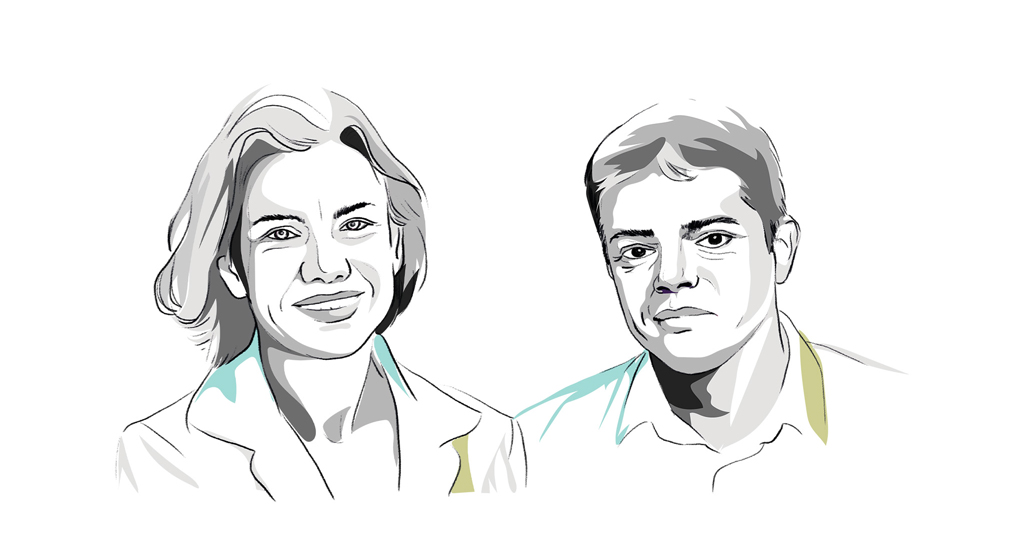Understanding the destabilisation caused by the emergence of “breakthrough” players in the urban environment; overcoming tensions between the “magical thinking” about smart cities and the reality on the ground in cities; establishing a dialogue between governance and innovation… these are all issues raised in the study “Audacities. Innover et gouverner dans la ville numérique réelle” (Audacities. Governing and innovating in the real digital city), published in April 2018. Its two authors, Thierry Marcou and Mathieu Saujot (from think tanks Fondation Internet Nouvelle Génération and Institut du développement durable et des relations internationales, respectively), talk to Cécile Maisonneuve, chairwoman of La Fabrique de la Cité, another think tank.
What was the starting point for the study?
Thierry Marcou. For the (Fing), the study was the final link in a series of projects focusing on digital cities. The starting point for this was our work Ville 2.0, plateforme d’innovation ouverte (City 2.0, open innovation platform), which was published in 2006. Twelve years on, we thought it would be useful not to simply record successive urban innovations but to look into what isn’t working, to analyse the gap that can quickly appear between the comforting promise of seamless urban services, tirelessly repeated by startups and advocates of the smart city, and a confused, problematic urban reality, subject to new tensions brought about by disruptor practices.
Mathieu Saujot. At the (Iddri), we specialise in governance, while Fing covers innovation issues. This joint project provided an opportunity to bring our two areas of expertise together. Without this collaboration, we would probably not have been able, each from our own perspective, to form a relevant critical analysis of the “magical thinking” about the smart city.
Cécile Maisonneuve, do you think that this critical assessment of the smart city and the magical thinking that surrounds it is justified?
Cécile Maisonneuve. Actually, I would say it’s healthy! At , we avoid using the term “smart city”. Nevertheless, it has been around for 20 years. What strikes me is that although there is now consensus about the need to reject this “magical thinking”, the smart city continues to be the focus of seminars and conferences. It seems that, despite the tensions rightly mentioned by Thierry Marcou and the widely held criticism, the term is surviving when it should be dead and buried. Perhaps that’s precisely because innovation is failing to fulfil its promise, while at the same time the situation in cities is deteriorating and the need for discussion, for debate, remains strong.
M.S. Calling the “smart city” term into question is probably not enough. An elected official recently said to me: “Fair enough, we abandon the smart city, but what do we replace it with?” Maybe we need to use such concepts to guide discussions.
Calling the “smart city” term into question is probably not enough. An elected official recently said to me: “Fair enough, we abandon the smart city, but what do we replace it with?”
C.M. It’s an attempt to grasp a complex issue that we struggle to control. The term provides a shared narrative, which is something people need. The problem is that by adopting weak concepts which gain traction very quickly, we no longer know what they are supposed to mean and we think we’re talking about the same thing when we’re not. In this respect, I wonder whether the concept of resilience is now taking over from that of smart city, as a kind of catch-all term.
A theme that runs through your work, alongside concepts, is the fact that urban disruptors are blind to the realities in cities. How do you explain this?
C.M. Startups are very focused on techno-solutionism and generally don’t have a very well-developed institutional culture. That undoubtedly hinders the effectiveness of their solutions, because thinking about democracy means thinking about the effectiveness of solutions over time. And if the time aspect isn’t incorporated into discussions about cities, inclusive cities at any rate, then this will lead to failure. Another thing I notice is that the big digital players – Google, Apple, Facebook, Amazon, and Microsoft – have been built on the same culture of monopoly (when they enter a market, they don’t target a segment but the whole market) and secrecy. Which is the exact opposite of what society wants; people are looking to see greater cooperation and transparency.
M.S. The culture of monopoly and secrecy may work in the virtual world – and disruptors rely on it to lend credibility to their “magical” argument – but it becomes difficult to sustain in real cities. Monopolies cannot withstand the competition from urban public contracts. And as for secrecy, well that can’t be maintained for very long in a public service concession.
Startups are very focused on techno-solutionism and generally don’t have a very well-developed institutional culture. That undoubtedly hinders the effectiveness of their solution
But aren’t startups beginning to take into account this friction with reality?
T.M. It was disruption that prompted us to work on “Audacities”, having observed the increasing influence and the financial clout of companies like Uber, Deliveroo, Airbnb, and Amazon. But the way in which things have developed over the past few months is pretty remarkable. Uber is a prime example. The startup’s growth was initially based on a disruptive and exclusive model. Today, we see it striking deals with US cities to support subsidised public transport, as part of its idea to deliver a comprehensive range of mobility services. In France, Uber has clearly expressed its willingness to talk to some cities about supplementing their public mobility services. So, dialogue has eventually been established.
C.M. Let’s be positive! These players have experienced a reality check. But they’ve also shone a spotlight on some real issues. For example, “thanks” to Uber et al., we can no longer say that we’re not aware of the gaps and limits of our mobility systems, especially our public ones. They are forcing us to confront our own shortcomings in terms of governance.
T.M. This is not a binary issue. On the one hand, despite being attached to the foundations and values of collective systems, we all want to take advantage of these groundbreaking services, even when it means using underpaid bike couriers. On the other hand, there’s no denying the fact that Uber, in the Paris region at least, is filling a gap in the public transport network, through carpooling in particular. But when you see the extent to which shared driving is struggling to get off the ground and that solo driving still has force of law, you see what a lot of opportunities have been missed from not wanting to consider these options sooner and from clinging to a stigmatising attitude towards Uber and the threat it posed to the taxi monopoly!
So, cities bear some of the responsibility for the difficulty in establishing a constructive dialogue with such players?
M.S. There are also cultural barriers in the public sphere. When a city, faced with 10 carpool startups, decides to back them all even though each requires a critical mass in order to grow, then failure is inevitable. In China, cities choose a single champion and fully support it in its growth. In France, we need to strike the right balance between pushing innovation and ensuring equal opportunities. We need to be capable of saying “this is where we want to head” and of giving ourselves the means to follow through.
What is the best way of strengthening the opportunities for dialogue between governance and innovation?
C.M. Politics is a key entry point. The role of elected officials is to provide a vision, to stake out a very clear position regarding their ambitions for their cities – beyond their 6-year term of office. It’s interesting to see some cities getting involved in well-structured forward-looking initiatives, when in France forward planning has always been the preserve of the government or very large companies. I’m thinking of the “Bordeaux Métropole 2050” programme.
T.M. I agree absolutely. Innovation is a political matter. So, let’s have the debate. I expect political candidates to have a personal position on data, on autonomous cars, on the internet of things. However, to move beyond magical thinking and to steer innovation, urban players must develop relevant assessment methodologies and frames of reference. Extensive efforts need to be made in this respect to acquire the necessary tools. It’s also a question of thinking about what scales and alignments are most appropriate in terms of guiding choices. After all, it’s within the framework of the network that European cities came together to provide a response to Airbnb…


